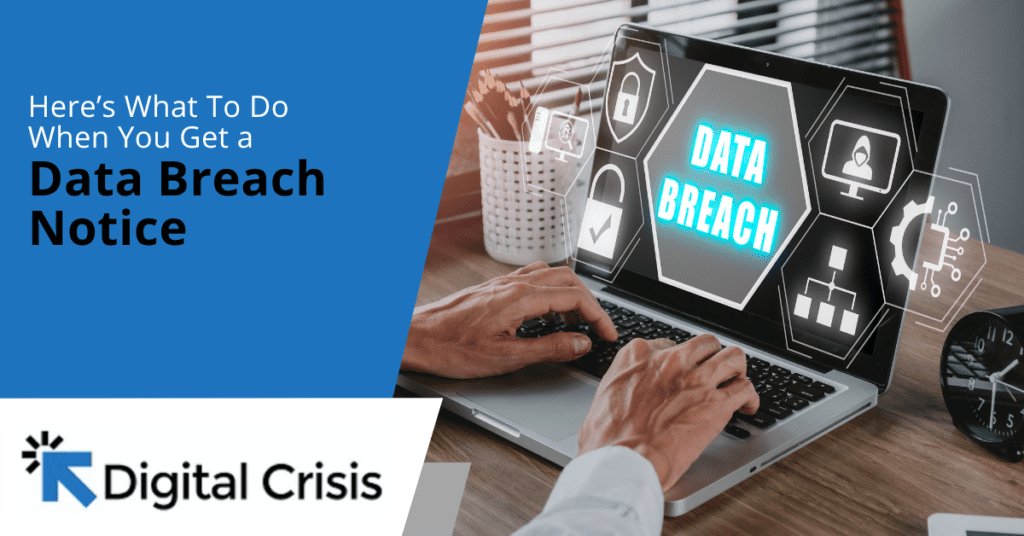
In today’s digital age, data breaches have become an unfortunate reality for individuals and businesses alike. With the increasing sophistication of cybercriminals and the vast amount of personal information stored online, it’s more important than ever to know how to respond when you receive a data breach notice. This article will guide you through the essential steps to take when you’re informed that your personal data may have been compromised.
Before diving into the action steps, it’s crucial to understand what a data breach is and why it matters. A data breach occurs when unauthorized individuals gain access to sensitive, protected, or confidential data. This can include personal information such as names, addresses, social security numbers, credit card details, and more. The consequences of a data breach can be far-reaching, potentially leading to identity theft, financial loss, and damage to your personal or professional reputation.
Data breaches can occur in various ways, including:
Understanding the type of breach that has occurred can help you better assess the potential risks and take appropriate action.
When you receive a data breach notice, it’s essential to act quickly and decisively. Here are the immediate steps you should take:
First and foremost, ensure that the data breach notice you’ve received is genuine. Cybercriminals often use fake breach notifications as a means to phish for more information. Contact the company directly using their official website or phone number to confirm the breach’s authenticity.
Carefully read the breach notice to understand what type of information was potentially exposed. Different types of data carry different risks, and knowing what was compromised will help you prioritize your next steps.
Immediately change your passwords for any accounts associated with the breached company. If you’ve used the same password for other accounts, change those as well. Use strong, unique passwords for each account, and consider using a password manager to keep track of them securely.
Wherever possible, enable two-factor authentication (2FA) on your accounts. This adds an extra layer of security by requiring a second form of verification, such as a code sent to your phone, in addition to your password.
After taking immediate action, it’s crucial to remain vigilant and monitor your accounts and credit for any suspicious activity.
Carefully review your bank and credit card statements for any unauthorized transactions. Report any suspicious activity to your financial institution immediately.
Request free credit reports from the major credit bureaus (Equifax, Experian, and TransUnion) and review them for any unfamiliar accounts or inquiries. You’re entitled to one free report from each bureau annually.
A credit freeze prevents new accounts from being opened in your name. While it can be inconvenient if you need to apply for credit, it’s one of the most effective ways to prevent identity theft.
Place a fraud alert on your credit reports. This notifies potential creditors that they should take extra steps to verify your identity before granting credit in your name.
While immediate action is crucial, protecting yourself from the long-term effects of a data breach requires ongoing vigilance and proactive measures.
Consider signing up for an identity theft monitoring service. These services can alert you to potential fraudulent use of your personal information across various platforms and databases.
Be more mindful about sharing personal information online. Only provide sensitive data on secure, encrypted websites and be wary of unsolicited requests for information.
Keep your devices and software up to date with the latest security patches. Regularly review and adjust privacy settings on your social media accounts and other online platforms.
Stay informed about the latest phishing techniques and be cautious of suspicious emails, links, or phone calls requesting personal information.
Understanding your legal rights in the event of a data breach is essential for protecting yourself and seeking recourse if necessary.
Familiarize yourself with data protection laws in your jurisdiction. In many cases, companies are required to notify affected individuals of a breach within a specific timeframe and may be obligated to offer credit monitoring services.
Keep detailed records of all communications related to the breach, including notices, emails, and phone calls. This documentation may be crucial if you need to take legal action or file an insurance claim.
If you suffer significant financial loss or other damages as a result of the breach, consider consulting with a lawyer specializing in data privacy and cybersecurity law.
While responding to a data breach is crucial, being prepared before one occurs can significantly mitigate its impact. Consider creating a personal data inventory, listing all the accounts and types of information you have stored online. This can help you quickly identify what might be at risk in the event of a breach.
Regularly backing up important data and storing it securely can also provide peace of mind and protect you from data loss in various scenarios, including breaches.
Data breaches are an unfortunate reality of our digital world, but being informed and prepared can significantly reduce their impact on your life. By taking swift action, monitoring your accounts, and implementing long-term protection strategies, you can minimize the risks associated with data breaches and protect your personal information.
Remember, staying vigilant and proactive is key to safeguarding your digital identity. If you’re concerned about your online security or need assistance in responding to a data breach, don’t hesitate to reach out to us at Digital Crisis. We specialize in helping individuals and businesses navigate the complex landscape of cybersecurity and data protection.
Our team of experts is ready to provide personalized guidance and support to ensure your digital presence remains secure. Contact us today to learn more about how we can help you protect your valuable data and maintain peace of mind in an increasingly connected world.